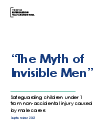Happy New Year to you all from the Library Staff
Things about child health...
Below you can find the joint Commissioners’ (England, Northern Ireland, Wales and Scotland) reports to the UN Committee on the Rights of the Child.
Every five years, the Committee examines the whole UK on how well it is meeting its promises under the UN Convention on the Rights of the Child (UNCRC). The reports on this page are submitted to the Committee. They assess how the UK Government and devolved administrations have progressed towards giving every child the opportunities and protections enshrined in the UNCRC.
The “Report of the Children’s Commissioners of the United Kingdom of Great Britain and Northern Ireland to the United Nations Committee on the Rights of the Child”, including a “Covid-19 annex”, identifies emerging trends and key issues regarding children’s human rights in the UK. Some of these draw on previous concluding observations while others reflect worrying trends caused by the UK’s departure from the European Union (Brexit) and the Covid-19 pandemic.
The report “Are we there yet?” is based on engagement with children and young people in all four nations, and it aims to provide the Committee with children and young people’s voices about their experiences on the delivery of their rights. A summary report goes alongside it.
Things about children and justice...
This report from the Children's Commissioner looks at the issues around children in the justice system.
The past decade has seen a welcome reduction in the numbers of children getting caught up in the criminal justice system. Since 2010, the numbers receiving a caution or sentence have fallen by 83% and the number of children in custody has fallen by 73% to 571 in August 2020. But there are still hundreds of children ending up in our courts and prisons. By comparison, in 2015, there were only 13 children aged 15-17 in prison in Sweden, Norway, Iceland, Finland and Denmark combined.
We know how and why many of these children end up involved in violence and crime. The blueprint is there for all to see – children growing up in turmoil and experiencing trauma, but not receiving the support and protection they need. Or worse, targeted by those who wish to exploit their vulnerabilities for personal gain. Our under-resourced system of child protection was not designed to safeguard against risks outside the family home and is creaking under the pressure of trying to keep kids safe.
Many of these children have been let down by the systems that should be keeping them safe from harm before they ever set foot inside a police station. Over half (56%) of children sentenced are currently or have previously been a ‘Child in Need’ (assessed as needing additional support from the state) and 7 in 10 have identified mental health needs. 85% of boys in young offender institutions have previously been excluded from school. When compared to their peers, children in residential care are at least 13 times more likely to be criminalised.
At every stage of a child’s journey through the criminal justice system, opportunities are being missed to get to the root causes of offending and put children’s best interests at the heart of the response. When children’s home staff call the police on a child for damaging property, rather than ground them or dock their pocket money as a parent might. Or when they meet a police officer unable to recognise vulnerability and trigger a safeguarding response. Or when the courts remand children to custody before they’ve even been tried – last year almost a third of children in custody were on remand, two thirds of whom never went on to receive a custodial sentence. Ultimately, the system fails to see the child first and the ‘offender’ second, which reduces the opportunity for real change. This appears to be particularly true for Black children, who are over four times more likely to be arrested than White children. Despite accounting for only 18% of the general population, children from BAME backgrounds now make up almost half (49%) of the entire population of youth custody.
The number of children in custody in this country is half the size of a secondary school and yet custodial institutions are failing to even keep children safe, let alone rehabilitate them. Levels of violence are high, and over a third (35%) of children have felt unsafe in Young Offender Institutions and Secure Training Centres. This violence leads to incidences of restraint and a situation where children are spending hours at a time shut in their cells, rather than accessing the education or support they need to turn their lives around. Too many children are set up to fail when they leave, because not enough is done to find them the right place to live, or get them the treatment or education they need on release. Is it any wonder that 7 in 10 children released from custody reoffend within a year?
We need a radical new approach to preventing children becoming involved in crime and turning children’s lives around when they have spiralled out of control. This means: stopping gangs from exploiting vulnerable children; identifying children at risk of getting involved in crime and diverting them away from that path; reducing the numbers of children in custody to an absolute minimum and transforming secure care for children so that rehabilitation is at its heart.
This about unhealthy food and drink...

It was announced in December that promotions on food and drinks high in fat, salt or sugar (HFSS) in retailers will be restricted from April 2022. Offers for unhealthy foods like ‘buy one get one free’ and promotions in prominent locations in stores and online to be restricted from April 2022. Free refills of sugary soft drinks will also be prohibited in the eating-out sector. Restrictions will apply to medium and large stores. The new rules, designed to support the nation to make healthier choices, will prohibit retailers from offering multibuy promotions such as ‘buy one get one free’ or ‘3 for 2’ offers on these products. Unhealthy promotions will also no longer be featured in key locations, such as at checkouts, store entrances, aisle ends and their online equivalents. Promotions often appear to help shoppers save money. However, data shows that these deals actually increase purchases of promoted products by almost 20%. They encourage people to buy more than they need or intended to buy in the first place
Things to attend...
Our next Reading Group will be on 3rd Feb at 18:30 meeting by Microsoft Teams - please contact us if you want to be added to the mailing list or if you want the link to join a specific group. Our next book is the modern classic by George Orwell Nineteen Eighty-Four. Interesting parallels with our world today I think and 'fake news'.
...and also Journal Club
The next meeting will be on 12th January 13:00 - 14:00pm meeting virtually & physically from the Education & Skills Centre, F Floor Stephenson Wing discussing the paper 'Intracranial injuries on computed tomography head scans in infants investigated for suspected physical abuse: a retrospective review'. Please contact the library fo attending information and a copy of the paper. Bring your own muffins!
Things about eating disorders...
The Royal College of Paediatrics and Child Health (RCPCH) is alerting parents and guardians to look out for signs of eating disorders in children and young people. The College spoke to paediatricians from around the country working in the field allll had seen an increase in cases in the last year, and all put this down to the effects of the pandemic on young people’s lives.
A number of factors are thought to have contributed to increased stress, deterioration in young people’s mental health and an intense focus for some on eating and exercise during the pandemic. These include: isolation from peers during school closures, exam cancellations, loss of motivating extra-curricular activities such as sports, dance/drama/youth clubs; an increased use of social media with young people concentrating on unrealistic ideas of body image; being forced to quarantine (a particular problem for many students newly arrived at university); worries about families’ economic problems; illness or death of loved ones, and fears about contracting the virus.
Dr Elizabeth Allison, Lead Consultant Paediatrician for eating disorders at Sheffield Children’s Hospital (medical lead in the region for the community eating disorders service):
“We’ve seen around twice the number of referrals for medical outpatient reviews and around twice the numbers of inpatient medical admissions for patients with Anorexia Nervosa in 2020 compared to 2019 and these numbers appear to be continuing to rise even further since September. The lockdown in the COVID-19 pandemic has created a fertile ground in which eating disorders can flourish. This is maybe due to the confinement away from young people's normal social and educational structure and also perhaps due to the increased exposure to social media influences. We are concerned that we may continue to see this trend continue over the next year or more."
Things to make...
Our latest Reading group book that was much enjoyed was The Giver of Stars by Jojo Moyes. How much more fun it would have been if we had all had some of this
Apple Cake with Bourbon Honey Glaze to eat along with it (scroll down the page for the recipe). This blog suggests recipes based on various books and I think we should embrace this idea when we can return to physical meetings.



















































